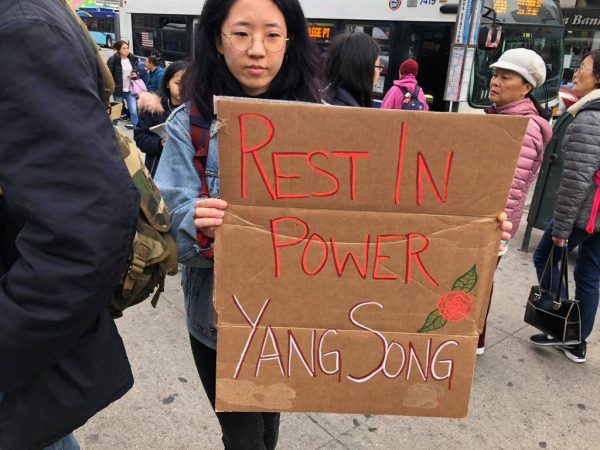
As we gathered on the busy street corner in front of the Queens Public Library in Flushing on Friday March 29th, over one hundred community members heard our cry: “性工作是真工作!” Sex work is work!
The police had blockaded Red Canary Song members from the library steps, protecting the carceral narratives that were being pushed inside by City Council Member Peter Koo and the NYPD—CM Koo, the NYPD, and a slew of other City initiatives were hosting a “How to Spot and Combat Human Trafficking” seminar inside the library behind us. Regardless of the heavy police presence, we continued our teach-in, passing out Know-Your-Rights trainings in English, Spanish and Mandarin to community members and passerby. Direct services providers and advocates spoke, dispelling myths and misconceptions that surround migrant massage and sex work. One of the main myths that we sought to challenge is the perspective both the police and Polaris favor: that all Asian massage workers are perpetrators or victims of sex trafficking. Many speakers and some community members referenced the recent case of Robert Kraft directly. Through the almost three hour long teach-in, we distributed upwards of one thousand pieces of print materials to participants and passersby.
The public is fed the racist myth that all Chinese massage parlors are involved in human trafficking. In fact, most Chinese workers do this work because it is the most sensible work for them to do, especially when they are new immigrants to the country and do not have access to other opportunities or employment training. For many, it is simply the fastest way to send money home, and it makes the most practical sense at this time of their lives.
“The massage parlor is a platform for our survival [here] when there are not [a lot] of other services to help immigrants transition into the country,” explains Elle, a veteran Flushing massage parlor worker.
(Im)migration, as it relates to Asian and specifically Chinese women, as well as feminine and gender non-conforming sex workers, is far more complicated than most people realize.
The Chinese hukou system, which restricts people to living in the rural area where they are born, making workers illegal in their own country, is a huge driver of internal “migrant sex workers” with no working rights in China. It is also a huge driver of migration out of China under Deng Xiaoping’s policies, which actively promoted rural migration out of China rather than overcrowding Chinese cities. These migrant sex workers often end up in Hong Kong, where our comrade Elene Lam met them as Director of Zi Teng, a sex worker rights organization in Hong Kong. By way of Hong Kong, these same workers often end up in Flushing or Toronto.
It’s an incredibly global network, connected through newly possible digital networks. Elene has literally met the same workers she has done outreach with in Canton, then Hong Kong, and then Toronto. This sequence of migration is driven by government policies that restrict the labor rights of Chinese workers who are made illegal in their own country, due to an internal caste system of rural vs. urban workers. Yet these migrant sex workers also do much to support Chinese economic development by sending a large portion of their money home.
It’s ironic and laughable in the darkest sense when Christian charities in “international development” work travel to countries like Cambodia and Thailand to convert sex workers into garment workers. Do they recognize how much “international development” these sex workers are already doing? Much more than a charity promoting the sale of handmade trinkets could ever manage.
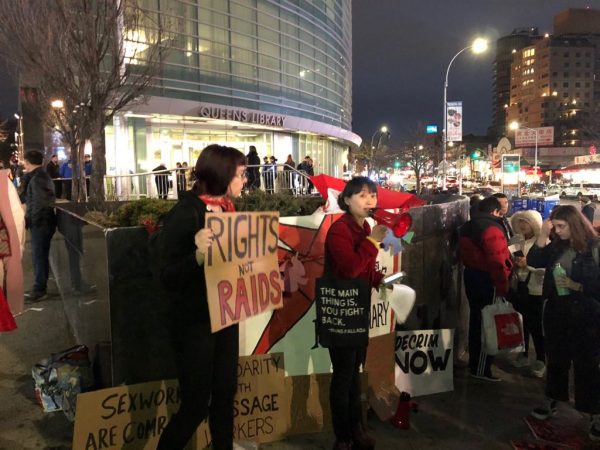
Globalization policies favor the so-called “First World”, which is happy to benefit from low-paid factory labor from China and other developing countries. The West advocates for free trade in the form of foreign investment in countries in Southeast Asia, yet our government doesn’t want free trade when it comes to freedom of labor movement or open borders. What kind of “free” trade is that? Migrant sex workers are negotiating the inherent inequality in First World economic policies. Their labor conditions and relegation to “shadow economies” further expose global late-stage capitalism for its inherent racialized and gendered exploitation.
Fear of the police is usually the most pressing worry on the minds of criminalized migrant workers , above fear of violence from customers, because they are afraid of the public shame that comes with arrest, and also afraid that arrest or criminal charges will endanger their immigration status. These are plausible fears, especially under the current administration
The multi-agency police investigation that led to Kraft’s arrest went on for eight months. During this time, the investigation videotaped massage workers and clients, ultimately arresting over 200 people and shutting down over twelve businesses while promising more would follow.
As reported by Charlotte Shane, “Though state attorney Dave Aronberg and Martin County Sheriff William Snyder are still hammering the narrative of ‘human trafficking,’ only one human trafficking charge has been brought. ”
If this case was such a dire example of human trafficking, why eight months? Why entrap and arrest “victims?” This demonstrates either a lack of regard for the suffering of Chinese massage workers, or disingenuous targeting of high profile men through false claims of immigrant exploitation. In past cases against Chinese massage parlor businesses, despite the promises of law enforcement, Chinese workers swept up in raids for trafficking have often received punitive immigration charges, even if criminal charges for trafficking have not been imposed. Both criminal and immigration charges have a devastating impact on migrants. The Health Department, licensing departments, police, and ICE should not legally be sharing information, but in practice, they usually do. We’ve now been following the case long enough to see the Orchids of Asia Day Spa & Massage workers be charged and pursued more harshly than Kraft. It’s not that we are advocating for client criminalization. We are simply pointing out the racism and misogyny that is inherent in the legal system.
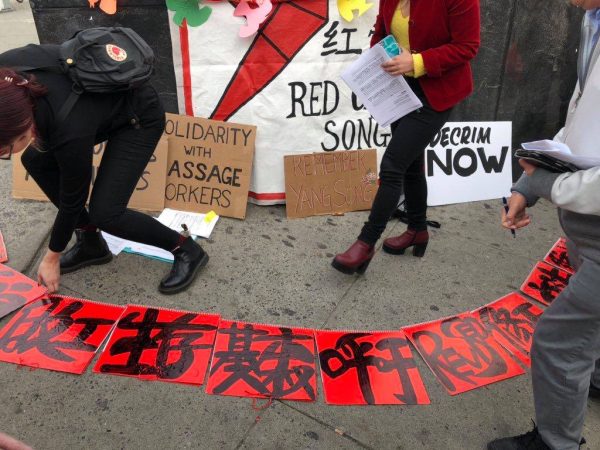
The media is quick to call out “signs of trafficking” when it comes to Chinese spas. Police in the Kraft case report finding refrigerators inside the targeted parlors. They are calling this a sign of trafficking, because people were eating and living out of these workplaces. As one of our organizers put it: “There are also refrigerators in the midtown machine learning startup where I’ve worked as a software engineer, often staying very late nights on the couch to meet deadlines, but there, the provision of these office amenities would never be seen as signs of exploitation.”
The police departments involved in this case have tweeted about the care packages of shampoo and mouthwash that they’ve sent these massage worker “victims” to demonstrate their good will, including English religious literature entitled “What on Earth am I here for?” Many of these demonstrations seem more geared for the public than for the Chinese workers themselves, who would probably prefer not being deported to a religious text they can’t read. .
Meanwhile, fans of rival football teams made “pilgrimages” to the Chinese spa patronized by Kraft, jeering at the nature of the work. They dehumanized and derided massage workers while pretending to also be concerned about human trafficking rather than simply savoring the Patriots’ shame.
Fear of the police drives the owners of these Chinese massage establishments to take a lot of extra precautions when it comes to communication and transportation, sometimes even initially hiding the addresses of workplaces when they pick up new workers from airports who have answered ads on Chinese chat platforms. The workers who answer ads in these community channels travel from city to city, working short-term contracts to make as much money as possible in a small amount of time, without other plans for living accommodations while they are there. Some Chinese workers are indeed spending up to six or seven days a week working in the same rooms where they await customers, sometimes sleeping in the same beds where they are working because it is not practical for them to rent out another space. Under current employment laws, their bosses are not required to provide other living accommodations for their employees. Long working hours in isolation jeopardize parlor workers’ mental and physical health.
Chinese massage parlor managers, who are usually former or current massage workers themselves, often partner with their favorite worker, the most senior or competent of the workers, to manage operations. Often times, the parlor is a tight-knit community, and the women working in it treat each other as friends as well as business partners. Most of the time, the relationships in these massage parlors are very collegial and respectful, as women are often providing employment to other people from their hometowns in China whom they think of as good friends and whom they depend on in a country that is foreign to them.
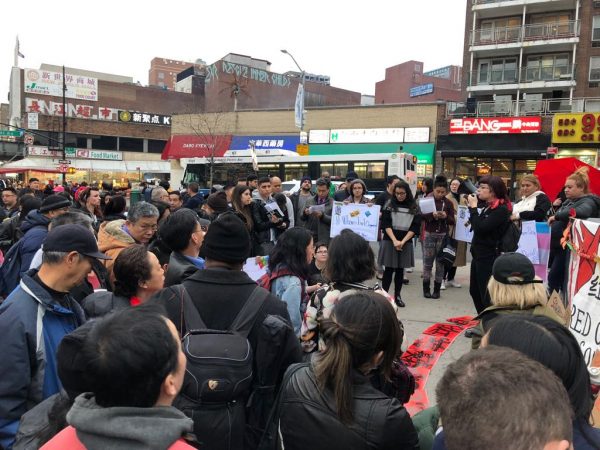
The majority of anti-trafficking organizations spread public disinformation, warning people that anyone speaking with a foreign accent and showing “signs of emotional distress” might be a trafficking victim. They contribute to public ignorance and xenophobia, without providing real insight into the lives of immigrant workers, and these workers’ justified fear of law enforcement and immigration officers.
The way to tackle these labor issues is not to use police raids, or law enforcement intervention of any sort, to impose more terror on these immigrant businesses—which in spite of these crackdowns, continue to pop up resiliently to meet society’s demands. Rather, as a society, we must stop erasing these workers, and instead, recognize that that all sex workers, both immigrants and documented citizens alike, deserve labor rights and protections. Communities, cities, and states need to divest from police and invest in social resources that materially support our most marginalized workers.
Anti-trafficking movement “leaders” (those executive directors whose salaries could fix a lot of immediate problems for people experiencing exploitative situations) need to be ousted. Harmful “perfect victim” narratives need to be abandoned. Instead, we need to embrace people’s complicated stories of survival. We must stop using anti-trafficking monies to fund the police. Instead, we should prioritize the funding of affordable housing, affirming healthcare, and food and cash assistance. If these fights are not won, we will be funding the same mutual aid and care efforts internally within our movement, with the same threatened cash flow, forever.
The human trafficking movement has pushed forward anti-immigrant laws, funding immigration control and surveillance. This is a dangerously inappropriate law-enforcement-centered approach to labor issues. It disempowers and imperils the very people it seeks to protect.
Most of the crimes covered under the umbrella of human trafficking are already crimes in and of themselves. It is unclear why we need another set of laws to criminalize kidnapping, violence, theft, or forced labor, when we could simply enforce existing laws. There has been a shift in the last few years to focusing more on underage sex work as trafficking. Underage sex work is already statutory rape. Forced sex of any kind is rape.
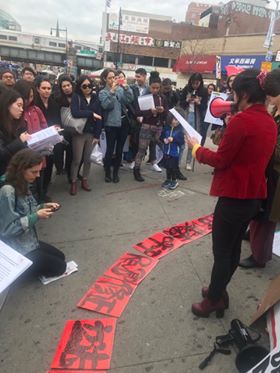
Centering the needs of the diverse groups of people, currently all lumped together under this American umbrella of “human trafficking,” means listening to how their individual needs differ. What immigrant massage workers need is different than what homeless youth need. The material conditions of their lives are different; their work environments are starkly different. As such, workers have to be at the table when policies are being drafted, when social service programs are being developed. Anything short of our direct leadership in shaping these efforts will result in violence through arrest, incarceration, deportation, and likely death.
There is such a diversity of work arrangements across the commercial sex industry and sex trade. The only way to tackle the specific harms in each sector is to champion unionizing and cooperative organizing among each group of workers themselves to decriminalize their labor and survival strategies. We need to focus on labor laws and never criminal laws—holding bosses accountable to expanded labor laws that protect workers’ rights. The only way to do this is to listen to sex workers, immigrants, trans and queer youth, and other people with lived experience telling us what sorts of labor protections, health and safety regulations, and welfare arrangements need to be put in place. We need to carefully consult with workers from each place of work and each subculture,so they can live their lives on their own terms.
Self-determination, bodily autonomy, workers’ rights, and workplace labor protections are truly the only way forward. If we want justice for all (im)migrant sex working people, that means opening all borders, abolishing (pol)ICE and letting massage workers fucking live.
In regards to the Kraft story in particular, we’d highly suggest this segment of Dave Zirin’s The Edge of Sports featuring journalist and Appeal senior staff writer Melissa Gira Grant, A Different Perspective on the NFL’s Robert Kraft, where she breaks down “the specter of trafficking.”
The aforementioned podcast segment is quite different from another one which also featured Melissa Gira Grant, as well as Polaris Project Executive Director and CEO Bradley Myles and Reason Magazine Associate Editor Elizabeth Nolan Brown—an NPR 1A segment titled, Sex Work And Sting Operations. We’d only suggest listening to this segment if you can stomach the rampant sexism, white saviorism, and respectability politics of Myles as well as the soft misogyny of the segment’s host, Joshua Johnson.
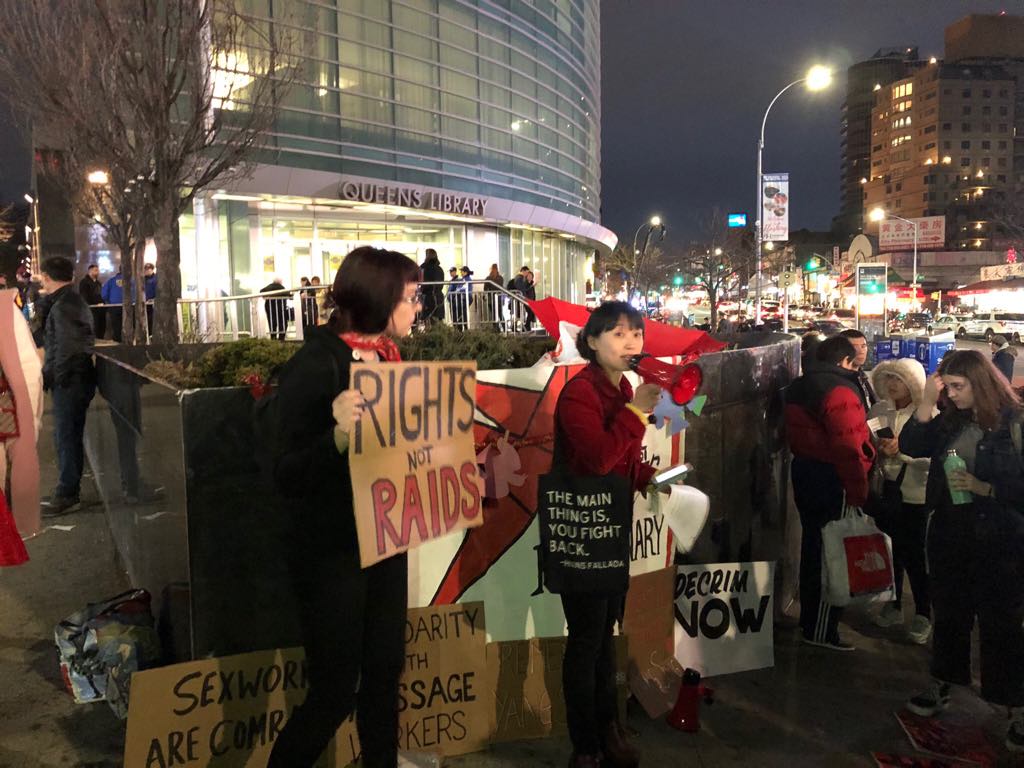
9 comments